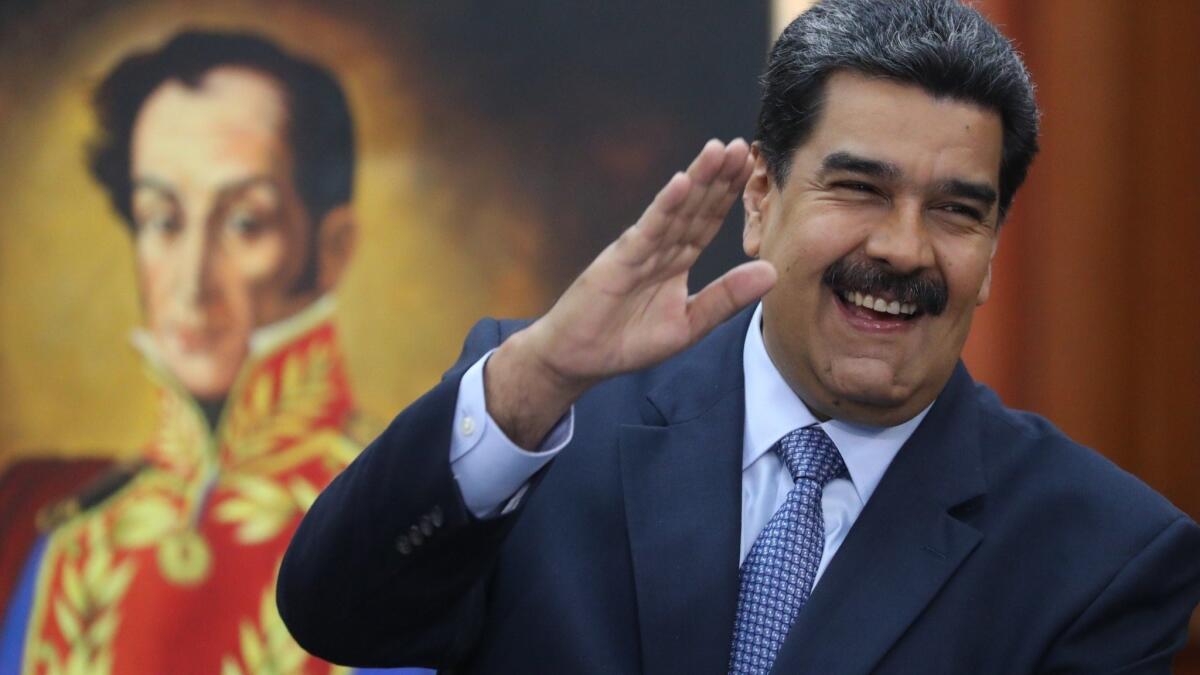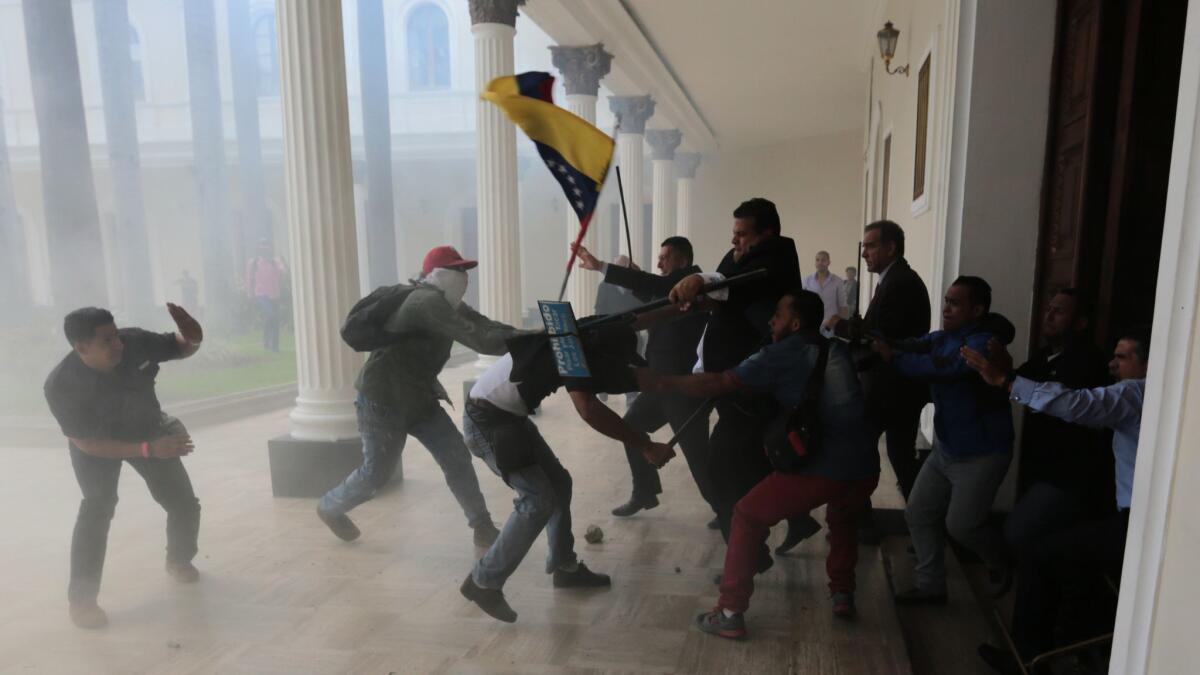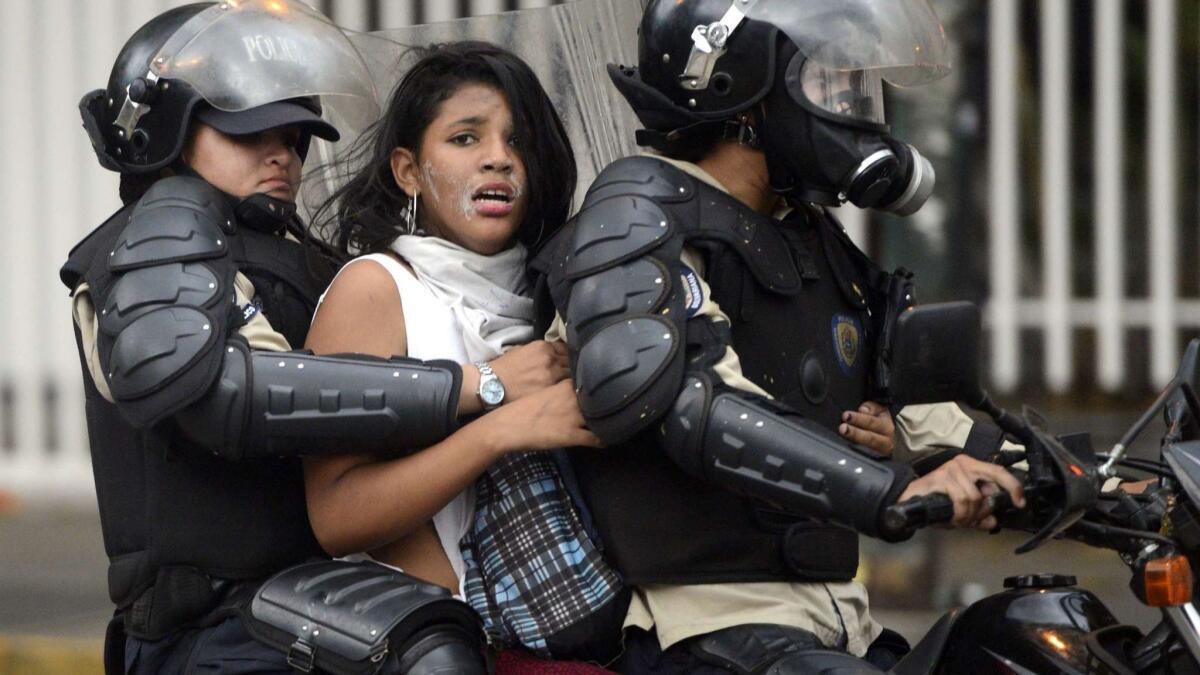As Venezuela falls apart, Maduro poised for six more years as president

- Share via
Reporting from Caracas, Venezuela — Having won a disputed election, Venezuelan President Nicolas Maduro will be sworn in for a second six-year term Thursday amid a crumbling economy and disintegrating society.
The handpicked successor of the late President Hugo Chavez, Maduro was first elected in April 2013, a month after Chavez died of cancer. Since then, rising poverty and crime in the once wealthy oil-producing nation have prompted a massive exodus of Venezuelans fleeing the country in search of better lives.
Hyperinflation and scarcities of food, medicine and basic goods ranging from car parts to coffins have made life miserable for the millions who remain.
With a dismal 15% approval rating, Maduro has only managed to keep himself in power with autocratic and repressive measures, critics say. Earlier this month, the Organization of American States referred to Maduro’s government as “dictatorial” and 13 South American nations in the so-called Group of Lima called for new presidential elections.
Maduro, a 56-year-old former bus driver, union organizer and once Chavez’s bodyguard, has dismissed such demands as a plot orchestrated by the U.S. Thursday’s inauguration is expected to take place before the supreme court in central Caracas amid tight security.
“It’s the imperialist mentality of the Group of Lima and the functionaries of the European parliament that believes we have to submit and kneel,” Maduro said in a speech broadcast to the nation Monday. “Venezuela must be respected and we will use our political and diplomatic faculties to make them respect us.”
Maduro finds himself increasingly isolated, with at least 40 nations, including the U.S., the European Union and neighboring Colombia, refusing to recognize him as legitimate president. His dwindling base of support includes Bolivia, Nicaragua, Cuba and other socialist governments in the region.

Some of his most vocal critics are from South American nations struggling to cope with the arrival of hundreds of thousands of Venezuelan migrants. Colombian President Ivan Duque, whose country now hosts 1 million Venezuelans, said nations should “reject the Venezuelan dictatorship and do everything necessary to restore democracy and constitutional order.”
This week the U.S. Treasury Department added seven more names to a growing list of Venezuelans, including Maduro, accused of corrupt practices, alleging they received $2.4 billion in illegal proceeds from foreign exchange manipulation and use of sham companies.
Venezuela’s economy is one of the gloomiest on the planet. Inflation during 2018 exceeded 1 million percent, and its economic output is expected to shrink by 10% this year after declining by 15% in 2018. The industrial trade group Conindustra reports that of the 12,500 companies that were members in 1997, only 2,500 exist today.
“The truth is that all of us Venezuelans are broken, weakened, exhausted and at the mercy of a devastating crisis,” said Caracas political analyst and pollster Jesus Seguias. “Millions of human beings are suffering, including those who have left the country as much as those still living here.”
Oil production, which in previous years was the source of most of Venezuela’s wealth, has fallen precipitously in recent years due to cash shortages and to U.S. sanctions that bar the import of oil field equipment and services. From an average output of 2.07 million barrels per day in 2016, crude production declined by more than half last year.
Widespread opposition to Maduro’s socialist government led to the election of opposition candidates who took majority control of the National Assembly in 2015. But Maduro immediately moved to block and, finally, negate congressional powers with decrees and with judgments from the Maduro-controlled supreme court.
The final blow came in 2017 when Maduro inducted a new Constitutional Assembly, which, packed with loyalists, dissolved the power of the National Assembly. Critics inside and outside Venezuela criticized the move as illegal and anti-democratic.
Maduro’s reelection in May, which he won with 64% of the vote, was widely criticized as a sham after several potential opposing candidates were disqualified from running.

For years, Venezuelans have taken to the streets in massive protests against Maduro. In 2014, weeks of demonstrations that often turned violent left 43 dead and 486 injured. In 2017, the protests were more widespread and violent with 157 dead, 15,000 injured and 3,000 arrested. Many of those arrested remain imprisoned.
The Venezuelan Penal Forum, a civil society group that monitors prison conditions, says that Maduro is holding 278 political prisoners. Freddy Guevara, a leading opposition assembly member, has been holed up in the Chilean Embassy in Caracas since the government issued an arrest warrant a year ago, claiming he incited violence during the 2017 protests.
Tomas Paez, a professor at Central University of Venezuela in Caracas, says that at least 4 million Venezuelans have emigrated since 1998 when Chavez first won election. Of those, he estimates 2.5 million have fled since 2015.
“The figures are increasing and will continue to increase as long as the country continues to grow more impoverished,” Paez said.
President Trump has raised the possibility of a military intervention, an idea that has received support from some exiled Venezuelans. But Tulane University professor David Smilde and others say such a move is opposed by a majority of Venezuelans and could lead to a long, bloody civil war, and increase the flow of migrants to neighboring countries.
“Diplomacy may be slow and frustrating. But a negotiated settlement would have the support of the people who matter most: the Venezuelans who must survive Maduro’s rule,” Smilde said.
Special correspondents Mogollon and Kraul reported from Caracas and Bogota, Colombia, respectively.
More to Read
Sign up for Essential California
The most important California stories and recommendations in your inbox every morning.
You may occasionally receive promotional content from the Los Angeles Times.










